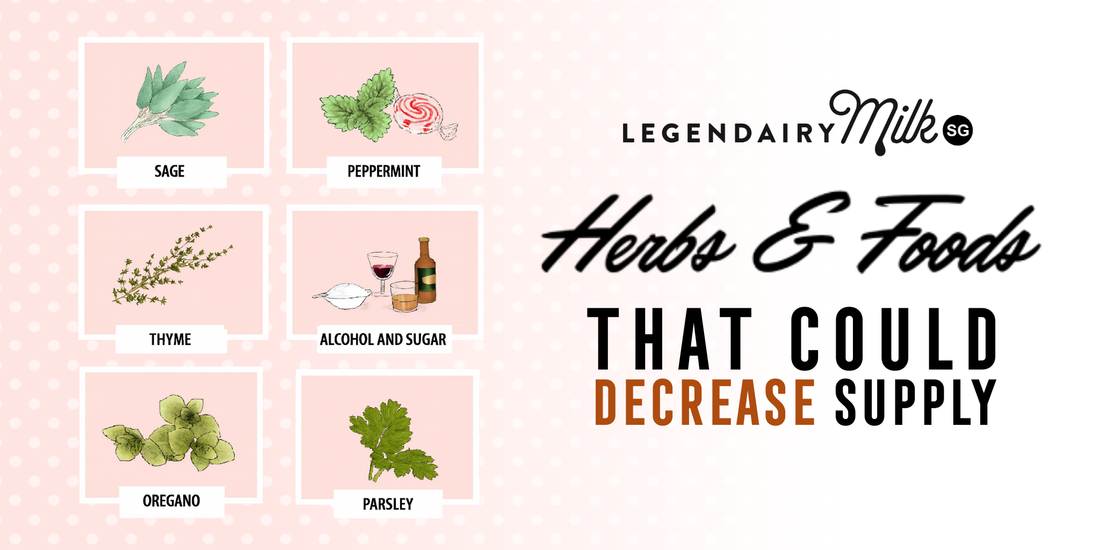
Herbs & Foods That May Decrease Breast Milk Supply
Share
If you’re breastfeeding and notice your milk supply dipping, certain herbs and foods can act as anti-galactagogues, meaning they may reduce milk production. Not every mom will be affected the same way, but it’s important to know which ingredients might make a difference.
Which Herbs Can Lower Milk Supply?
1. Sage and Milk Supply
Sage tea or tinctures are traditionally used to dry up milk. Some babies may become fussy when moms consume sage, while others are unaffected.
2. Peppermint, Spearmint, and Breastfeeding
Peppermint contains higher levels of menthol than spearmint. While menthol creams can soothe sore nipples, consuming peppermint tea, candies, or oils in larger amounts may lower supply. Peppermint oil should not be diffused near infants, as it may irritate their lungs.
3. Lemon Balm and Breastfeeding
This calming herb belongs to the mint family. While it helps reduce stress, some breastfeeding parents find it may also reduce milk output.
4. Parsley, Cilantro, and Milk Supply
These nutrient-packed herbs are fine in small amounts, but parsley juice or large servings can quickly reduce milk supply.
5. Fenugreek — Increase or Decrease Supply?
Although fenugreek is often sold as a lactation booster, many women report it actually decreases their milk. It can also cause stomach upset in both mother and baby. (All Legendairy Milk® products are fenugreek-free.)
6. Rosemary and Breastfeeding
Generally safe in cooking, rosemary may lower supply if eaten in large or frequent amounts.
7. Jasmine and Prolactin
Jasmine oil massaged onto the chest has traditionally been used to suppress lactation. Jasmine flowers may also reduce prolactin, the hormone responsible for milk production.
8. Oregano and Milk Supply
Oregano is often used as a culinary herb, but some breastfeeding parents notice a dip in supply with regular or concentrated use (such as oregano oil). If you’re sensitive, limit intake and monitor for changes in milk output.
9. Thyme and Breastfeeding
Thyme is another herb that may contribute to reduced milk production when consumed regularly or in concentrated forms (like thyme tea or oil). Occasional culinary use is typically safe, but consistent high amounts may impact supply.
Foods That May Reduce Breast Milk
10. Astringent Foods (Citrus & Sour Foods)
Foods high in vitamin C or citric acid can tighten tissues, reduce circulation to the breast, and lower milk flow.
11. Cruciferous Vegetables and Supply
Cabbage, broccoli, cauliflower, brussels sprouts, bok choy, and collard greens are healthy but may reduce supply in large amounts.
12. Adaptogens (Vitex/Chasteberry)
Vitex can help balance hormones in small doses but may reduce prolactin (and milk supply) when taken in larger amounts.
13. Alcohol and Breastfeeding
Alcohol suppresses the let-down reflex, making it harder to remove milk — which can eventually decrease production.
14. Sugar and Lactation
High sugar intake can cause insulin resistance and blood sugar imbalances, which may affect milk production and long-term hormonal health.
15. Caffeine and Milk Supply
Coffee, tea, chocolate, and energy drinks may make babies irritable and overstimulated. Excess caffeine can also stress mom’s system and indirectly reduce supply.
16. Carbonated Drinks and Lactation
Fizzy sodas may reduce appetite and overall calorie intake, which can negatively impact milk production.
When Can Foods That Decrease Milk Supply Be Helpful?
- Oversupply: Anti-galactagogues may help regulate milk flow when producing too much.
- Weaning: Some herbs and foods can make the transition easier and more comfortable.
Final Thoughts: Every Mom Is Different
Not all breastfeeding parents react the same way to anti-galactagogue foods. A small serving of parsley or peppermint tea may not affect you, but others may notice an immediate dip in supply.
If your milk supply has dropped unintentionally, focus on nutrient-dense foods and consider fenugreek-free lactation supplements to help restore balance.
